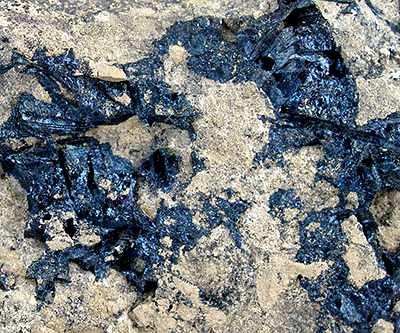Anilite
| Anilite | |
|---|---|
| Anilite from the Tilva-Mika deposit, Bor Mine, Bor , Bor-Majdanpek District, Serbia | |
| General and classification | |
| other names |
|
| chemical formula | Cu 7 S 4 |
|
Mineral class (and possibly department) |
Sulphides and sulphosalts - metal sulphides, M: S> 1: 1 (mainly 2: 1) |
|
System no. to Strunz and to Dana |
2.BA.05f ( 8th edition : II / B.01) 04/02/07/05 |
| Similar minerals | Djurleit |
| Crystallographic Data | |
| Crystal system | orthorhombic |
| Crystal class ; symbol | orthorhombic-dipyramidal; 2 / m 2 / m 2 / m |
| Space group | Pnma (No. 62) |
| Lattice parameters | a = 7.89 Å ; b = 7.84 Å; c = 11.01 Å |
| Formula units | Z = 4 |
| Twinning | Often, forms pseudocubic cells |
| Physical Properties | |
| Mohs hardness | 3 |
| Density (g / cm 3 ) | calculated: 5.68 |
| Cleavage | Please complete |
| colour | blue to gray |
| Line color | black |
| transparency | opaque |
| shine | Metallic luster |
Anilite is a rare mineral belonging to the mineral class of sulfides and sulfosalts . It crystallizes in the orthorhombic crystal system with the chemical composition Cu 7 S 4 . The mineral forms prismatic or flat crystals up to 5 mm in size. Here is a crystal twinning often, it forms pseudo-cubic cells.
Etymology and history
The mineral was recognized by the International Mineralogical Association (IMA) in 1968 . The first description was published a year later in the American Mineralogist by Nosuo Morimoto, Kichiro Koto and Yoshihiko Shimazaki. They found the mineral in the Ani Mine in Akita , Japan . In their work they described that a sample from Neudorf , Saxony-Anhalt could also be anilite, but was not recognized as an independent mineral by the descriptor H. Takeda. Other minerals could already be identified as anilite.
The type material of the mineral is stored in the National Natural Science Museum in Tokyo .
classification
Already in the outdated, but partly still in use 8th edition of the mineral classification according to Strunz , the anilite belonged to the mineral class of "sulfides and sulfosalts (sulfides, selenides, tellurides, arsenides, bismuthides)" and there to the department of "sulfides, selenides and tellurides" the molar ratio of metal: S, Se, Te> 1: 1 ", where together with Chalkosin , Digenit , Djurleit , Geerit , Roxbyit , Spionkopit and Yarrowit, it formed the group of" copper sulfides "with the system number II / B.01 .
The 9th edition of Strunz's mineral systematics , which has been in effect since 2001 and is used by the International Mineralogical Association (IMA), also assigns the anilite to the division of "Metal sulfides with M: S / Se / Te> 1: 1 (mainly 2: 1) " a. However, this is further subdivided according to the metals involved, so that the mineral can be found according to its composition in the sub-section "with copper , silver , gold ", where it is the only member of the unnamed group 2.BA.05f .
The systematics of minerals according to Dana , which is mainly used in the English-speaking world , assigns the anilite to the class of “sulfides and sulfosalts” and there to the “sulfide minerals” section. Here he is in the " chalcosin group " with system no. 04/02/07 within the subsection "Sulphides - including selenides and tellurides - with the composition A m B n X p , with (m + n): p = 2: 1".
Crystal structure
Anilite crystallizes orthorhombically in the space group Pnma (space group no. 62) with the lattice parameters a = 7.89 Å , b = 7.84 Å and c = 11.01 Å and four formula units per unit cell .
Education and Locations
The mineral forms associations with Djurleit, Covellin , Yarrowit, Spionkopit, Wittichenit , Tennantit , Chalcopyrite and Bornit .
Mineral addition to its type locality in Japan in Argentina , in the Atlantic Ocean on the mid-ocean ridges , in Austria , Australia , Brazil , Canada , Chile , China , Czech Republic , Germany , India , Indonesia , Iran , Italy , Japan , Peru , on the Philippines , Poland , Portugal , Russia , Serbia , Slovenia , Switzerland , Turkey , Great Britain and the United States of America .
See also
literature
- Nosuo Morimoto, Kichiro Koto, Yoshihiko Shimazaki: Anilite, Cu 7 S 4 , a new mineral In: American Mineralogist , Vol. 54, September / October 1969, pp. 1256–1268 ( PDF 779 kB , English)
- Kichiro Koto, Nobuo Morimoto: The crystal structure of anilite . In: Acta Crystallographica Section B . tape 7 , no. 26 , 1970, doi : 10.1107 / S0567740870003370 .
Web links
- Mineral Atlas: Anilite
- Web mineral: anilite
- Anilite - Database-of-Raman-spectroscopy
- Anilite - American-Mineralogist-Crystal-Structure-Database
Individual evidence
- ↑ a b IMA / CNMNC List of Minerals September 2014 (English, PDF)
- ↑ a b c d e f Kichiro Koto, Nobuo Morimoto: The crystal structure of anilite . In: Acta Crystallographica Section B . tape 7 , no. 26 , 1970, doi : 10.1107 / S0567740870003370 .
- ↑ a b c d Anilite , In: John W. Anthony, Richard A. Bideaux, Kenneth W. Bladh, Monte C. Nichols (Eds.): Handbook of Mineralogy, Mineralogical Society of America , 2001 ( PDF 59.7 kB )
- ↑ Nosuo Morimoto, Kichiro Koto, Yoshihiko Shimazaki: Anilite, Cu 7 S 4 , a new mineral In: American Mineralogist , Vol. 54, September / October 1969, pp. 1256–1268 ( PDF , English)
- ↑ Anilite at Mindat (English)
